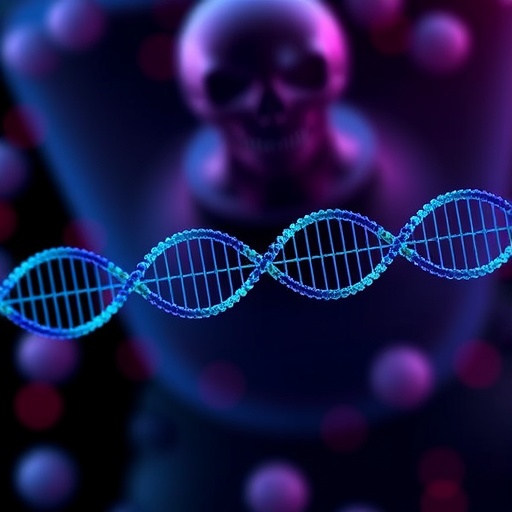The incidence of Human Papillomavirus (HPV)-associated oropharyngeal cancers, malignancies arising at the back of the mouth and throat, has been climbing steadily over recent years. While early-stage detection typically affords patients a high chance of survival, approximately one-fifth of individuals diagnosed with these cancers suffer from a poor prognosis due to aggressive tumor biology and resistance to conventional therapies. In a groundbreaking study led by researchers at the University of California San Diego, new insights have emerged uncovering the molecular underpinnings that drive these aggressive variants of HPV-positive oropharyngeal cancers. Central to the discovery is the formation of hybrid extrachromosomal circular DNA (ecDNA), a novel genetic structure composed of segments of HPV DNA fused with human genomic sequences.
Extrachromosomal circular DNA represents DNA molecules that exist outside the standard chromosomal architecture within the nucleus of the cell. These ecDNAs are typically small, circular pieces of DNA not anchored within chromosomes, yet they play outsized roles in cellular function, particularly in cancers. Previous research has implicated ecDNA in enabling tumors to evade immune detection and in amplifying oncogenes, thereby fueling unchecked cancer growth. However, one of the most striking revelations in this study is the promiscuous hybridization between segments of viral HPV DNA and human chromosomal material, creating chimeric ecDNAs. These structures have been detected in roughly 30% of HPV-positive oropharyngeal cancers, suggesting a common mechanism by which these cancers exacerbate their malignant potential.
A thorough transcriptional profiling of oropharyngeal tumor cells harboring these hybrid ecDNAs revealed the presence of previously uncharacterized enhancer elements. These enhancers, which reside on both the viral and incorporated human DNA segments, act synergistically to upregulate the expression of genes that promote tumor proliferation. This genomic interplay leads to a feedback loop that simultaneously boosts the replication of HPV viral DNA and escalates oncogenic signaling pathways within the host cells. In essence, the hybrid ecDNA acts as a molecular amplifier, enhancing both viral and tumorigenic gene activity to the detriment of the host.
The discovery of these powerful enhancers opened new avenues for targeted intervention. Employing CRISPR gene-editing technology, the research team successfully disrupted these enhancer regions, attenuating their transcriptional activity. Similarly, proteins known to regulate chromatin state and gene expression were leveraged to suppress the function of these enhancers. Both strategies yielded a significant reduction in tumor cell proliferation in preclinical models, highlighting the vulnerability of HPV-driven tumors reliant on ecDNA-mediated gene expression.
This research marks a critical advance in the understanding of HPV-related cancer biology by illuminating how viral-host DNA hybrid ecDNAs can hijack normal regulatory networks and accelerate tumor progression. Given that roughly 20% of HPV-associated oropharyngeal cancer patients currently face limited treatment options due to poor prognosis, these findings provide a crucial blueprint for the development of therapeutic modalities that selectively target the disruptive ecDNA structures without harming normal cells.
Takuya Nakagawa, the first author on the study and a rising star in the field now at Chiba University Hospital in Japan, emphasized the translational potential of this work. He noted that targeted disruption of hybrid ecDNA enhancers offers a compelling strategy to arrest tumor growth in the subset of patients with refractory disease. This selective approach contrasts sharply with conventional treatments that often carry substantial toxicity and indiscriminately affect healthy tissues.
Senior author Dr. Joseph Califano, director of the Gleiberman Head and Neck Cancer Center at UC San Diego Moores Cancer Center, underscored the broader implications of the work. His lab is actively investigating a spectrum of pharmacological agents capable of destabilizing ecDNAs not only in oropharyngeal cancers but also in other cancer types where ecDNA drives malignant phenotypes. This research is expected to accelerate the development of next-generation precision medicines that intervene at the genetic architecture level, disrupting the very DNA scaffolds that uphold tumor growth.
Of particular interest is Califano’s ongoing work delineating the complex crosstalk between HPV-associated ecDNA and the host cell’s chromosomal DNA. Initial findings suggest that the impact of ecDNA extends beyond the direct genes it carries, altering regulatory circuits on chromosomes throughout the genome. This genome-wide influence potentially reprograms entire gene networks, contributing to the resilience and adaptability of HPV-positive tumors.
The formation of hybrid ecDNA challenges traditional notions of viral oncogenesis, highlighting that HPV does not merely integrate into the host genome but also participates in forging novel extrachromosomal elements that profoundly reshape gene regulation. This paradigm-shifting insight compels a reevaluation of HPV’s role in cancer pathogenesis, underscoring the virus’s active involvement in genetic reconfiguration rather than passive insertion.
Therapeutic strategies aimed at eradicating or destabilizing ecDNA may revolutionize treatment for HPV-positive oropharyngeal cancers, especially those resistant to existing protocols. Combining CRISPR-based genome editing with drugs that affect epigenetic modifiers could form multi-pronged interventions able to dismantle the cancer’s genetic and epigenetic support systems. The precision of these emerging technologies promises fewer off-target effects and better patient outcomes.
Published in the esteemed journal Nature Communications on March 26, 2025, the full study details complex molecular techniques including high-throughput sequencing, chromatin immunoprecipitation, and advanced gene expression analyses. These comprehensive approaches enabled the unmasking of the clandestine genomic interactions orchestrated by hybrid ecDNAs, transitioning the field toward more nuanced models of cancer biology that integrate viral genetics.
As HPV-related oropharyngeal cancers continue their upward trajectory in the global cancer burden, scientific advancements such as this provide beacon-like hope for patients and clinicians alike. Harnessing the intricate knowledge of hybrid ecDNA formation and function opens the door to precision oncology treatments that could transform survival rates for those currently facing grim prognoses.
Subject of Research: Hybrid extrachromosomal circular DNA formed by HPV-human DNA fusion in oropharyngeal cancer cells and its role in tumor progression
Article Title: [Not explicitly provided]
News Publication Date: March 26, 2025
Web References:
– Full article: https://www.nature.com/articles/s41467-025-57447-9.epdf
References:
– DOI: 10.1038/s41467-025-57447-9
Keywords: Cancer research, DNA, Genes, Tumor cells, HPV, extrachromosomal circular DNA, oropharyngeal cancer, CRISPR, gene enhancers, viral oncology




